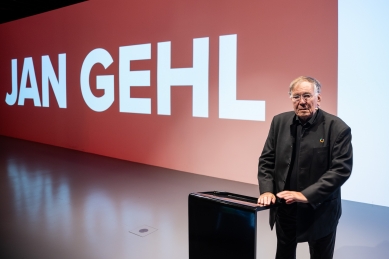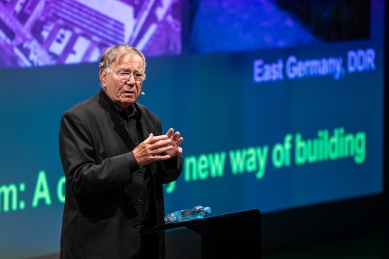
Danish urban planner Jan Gehl spoke in Prague about the future of cities
Source
Česká komora architektů
Česká komora architektů
Publisher
Tisková zpráva
03.11.2023 17:50
Tisková zpráva
03.11.2023 17:50
Czech Republic
Prague
Jan Gehl
On October 16th, the Czech Chamber of Architects (ČKA) organized a lecture by the Danish architect Jan Gehl at the Prague Center for Architecture and Urban Planning (CAMP), titled "On the Future of Cities." Jan Gehl, a global star of urbanism, has long been dedicated to sustainable urban development with an emphasis on the quality of life for people.
Architect Jan Gehl outlined his key design principles, which he defined based on years of research and practice since the 1960s. He spoke about the crisis of urbanism blindly following the Athens Charter of 1933, which declares the segregation of functions in the city and emphasizes transportation, about his experiences in humanizing several global metropolises, the success in Copenhagen, and issues of car traffic. He mentioned 12 main principles that public space should meet. The foundation is the human scale in urban design. Future cities should not be about buildings but about the people who live in them. Cars should not occupy the majority of public space, which should serve primarily for the quality of life of people. In addition to Copenhagen, which set a goal to be the most pleasant city in the world and achieved it, he also highlighted the current topic of the so-called fifteen-minute city and slow city, promoted by the mayor of Paris. Current research shows that 5,000 to 10,000 steps daily can extend life by 7 years and save costs in healthcare. People, especially seniors, in Europe’s aging population must have the opportunity to walk in an attractive and meaningful environment. During the discussion, panelists, along with Gehl, tried to apply these principles and recommendations for the environment of Czech settlements. Gehl himself mentions in his writings that humans as a species are the same all over the planet, which is why he recommends drawing inspiration from examples of good practice and trying to apply what works elsewhere in other places as well.
Jan Gehl considers the sprawl of cities into surrounding areas to be a fundamental problem. The vision for the future should be concentrated cities with functional living centers. Gehl emphasizes in his texts the traditional urban development in human scale, perceived by humans who move naturally, that is, walking at a speed of 5 km/h, not traveling by car.
The issue of disproportionate car traffic in cities and the related filling of public space with vehicles was discussed. Jan Gehl pointed to several examples, primarily from his home country of Denmark and the metropolis of Copenhagen, where restricting traffic has succeeded in calming and cultivating public space and returning it back to people. "There were voices saying that without cars, stores would fail, that Danes are not Italians to occupy public space. But after the modifications, it turned out that in Denmark, mainly Italians live and that pedestrians shop more than people behind the wheel," he noted. According to Jan Gehl, change is possible everywhere, and he has long been open about not accepting the argument "it can't be done here." Inspiration from functioning solutions is simultaneously the economically least disadvantageous solution. Thanks to his worldwide experience, he could present successful examples of cities that initially seemed complicated for implementing bike paths, such as San Francisco, Hobart, or New York. He highlighted the importance of data in arguments for quality urban development, as well as the participation and education of the public. Danish public television devotes considerable space to debates about the quality of cities. Jan Gehl wished Prague progress with the modifications to the Magistrála, which his studio focused on 8 years ago.
Architect Jan Gehl outlined his key design principles, which he defined based on years of research and practice since the 1960s. He spoke about the crisis of urbanism blindly following the Athens Charter of 1933, which declares the segregation of functions in the city and emphasizes transportation, about his experiences in humanizing several global metropolises, the success in Copenhagen, and issues of car traffic. He mentioned 12 main principles that public space should meet. The foundation is the human scale in urban design. Future cities should not be about buildings but about the people who live in them. Cars should not occupy the majority of public space, which should serve primarily for the quality of life of people. In addition to Copenhagen, which set a goal to be the most pleasant city in the world and achieved it, he also highlighted the current topic of the so-called fifteen-minute city and slow city, promoted by the mayor of Paris. Current research shows that 5,000 to 10,000 steps daily can extend life by 7 years and save costs in healthcare. People, especially seniors, in Europe’s aging population must have the opportunity to walk in an attractive and meaningful environment. During the discussion, panelists, along with Gehl, tried to apply these principles and recommendations for the environment of Czech settlements. Gehl himself mentions in his writings that humans as a species are the same all over the planet, which is why he recommends drawing inspiration from examples of good practice and trying to apply what works elsewhere in other places as well.
Jan Gehl considers the sprawl of cities into surrounding areas to be a fundamental problem. The vision for the future should be concentrated cities with functional living centers. Gehl emphasizes in his texts the traditional urban development in human scale, perceived by humans who move naturally, that is, walking at a speed of 5 km/h, not traveling by car.
The issue of disproportionate car traffic in cities and the related filling of public space with vehicles was discussed. Jan Gehl pointed to several examples, primarily from his home country of Denmark and the metropolis of Copenhagen, where restricting traffic has succeeded in calming and cultivating public space and returning it back to people. "There were voices saying that without cars, stores would fail, that Danes are not Italians to occupy public space. But after the modifications, it turned out that in Denmark, mainly Italians live and that pedestrians shop more than people behind the wheel," he noted. According to Jan Gehl, change is possible everywhere, and he has long been open about not accepting the argument "it can't be done here." Inspiration from functioning solutions is simultaneously the economically least disadvantageous solution. Thanks to his worldwide experience, he could present successful examples of cities that initially seemed complicated for implementing bike paths, such as San Francisco, Hobart, or New York. He highlighted the importance of data in arguments for quality urban development, as well as the participation and education of the public. Danish public television devotes considerable space to debates about the quality of cities. Jan Gehl wished Prague progress with the modifications to the Magistrála, which his studio focused on 8 years ago.
The English translation is powered by AI tool. Switch to Czech to view the original text source.


1 comment
add comment
Subject
Author
Date
Spojení Muzea a náměstí
Vích
04.11.23 01:56
show all comments






